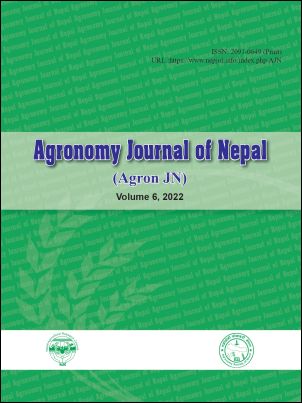Diversified and Long-term Cropping Systems Alters the System Sustainability and Energy Use Efficiency in Soils of Indo-Gangetic Plains
DOI:
https://doi.org/10.3126/ajn.v6i1.47917Keywords:
Agro-ecological regions, energy use efficiency, intensive cropping systems, sustainabilityAbstract
The cereal-based intensive cropping practices have posed the yield at a plateau and reduced the energy use efficiency (EUE) of the cropping systems in the Indo-genetic plains (IGPs). The long-term cropping systems experimentations with 4 diversified legumes and cereal cropping systems and a grassland fallow system were studied for >10 years representing different agro-ecological regions at the agricultural research farm, IAS, BHU-Varanasi, Uttar Pradesh of IGPs to assess their impacts on system productivity and energy use efficiency. Out of 4 cropping systems viz, Pigeon pea-Pigeon pea (PP-PP) and Rice-Maize (R-M) systems were managed as conventional cultivation running under the breeding project, however; Dryland Rice-Lentil (R-L) and Zero-till Rice-Wheat (R-W) systems were running under agronomy project. The grassland fallow system was maintained in the agronomy block. The maximum system productivity was seen in the zero till rice-wheat (8185 kg ha-1) system and the lowestpigeon peanpea- pigeonpea system (1615 kg ha-1). However, the maximum EUE was found in pigeonpea system (13.23 MJ ha-1) and the lowest in the zero till rice-wheat system (8.88 MJ ha-1). The study suggests that the inclusion of legumes in the cropping system is vital in enhancing the system productivity and energy use efficiency than the long-term cereal-based system in long-run to the alluvial soils of IGPs.
Downloads
Downloads
Published
How to Cite
Issue
Section
License
Copyright (c) 2022 Agronomy Society of Nepal (ASoN)

This work is licensed under a Creative Commons Attribution-NonCommercial 4.0 International License.
ASON permits for free use, distribution and reproduction in any medium if the original work is properly cited and not used for commercial purposes.




